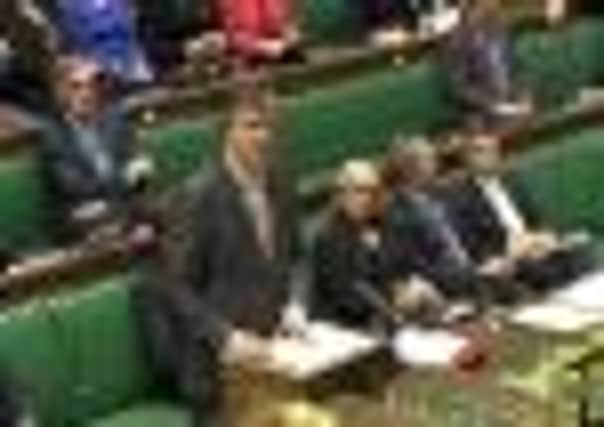Westminster outlines referendum plans as Salmond aims for Autumn 2014


A draft order drawn up in Westminster would temporarily extend the powers of the Scottish Parliament to allow it to call a referendum on the single question of whether or not Scotland should remain part of the United Kingdom.
A consultation paper published by Scotland Secretary Michael Moore today proposes a “Section 30 order” to give Holyrood the power to deliver a referendum. The order would have to be approved by both Houses at Westminster and by the Scottish Parliament.
Advertisement
Hide AdAdvertisement
Hide AdOfficials said this method would allow a referendum to be staged within 12-18 months if all parties co-operate, but the question of whether a legal deadline should be included in the order will not be decided until after the consultation concludes on March 9.
Ministers said they want any poll to be held “sooner rather than later”, to reduce uncertainty, which they believe is damaging the Scottish economy.
Meanwhile, First Minister Alex Salmond said that he would like to hold a referendum in Autumn 2014.
He said the date will allow people to “hear all the arguments”.
He added: “This has to be a referendum that is made in Scotland.”
The order proposed by the UK Government would require any referendum to be held under the terms of electoral laws passed at Westminster in 2000, under the oversight of the Electoral Commission.
There would be only one ballot paper offering voters a single choice between the two options of independence or remaining part of the UK. All those registered to vote in Scottish parliamentary elections would be entitled to vote, and the poll could not be held on the date of any other referendum.
Today’s paper also set out the alternative of using legislation at Westminster to authorise the referendum, possibly by an amendment to the Scotland Bill which is currently going through Parliament.
Advertisement
Hide AdAdvertisement
Hide AdBut it made clear that the legal opinion of the UK Government is that, without either of these measures, the Scottish Parliament does not itself have the power to pass legislation to trigger a referendum.
“It is the UK Government’s view that any bill introduced in the Scottish Parliament providing for a referendum on independence would be outside the powers of the Scottish Parliament and, if challenged, would be struck down by the courts,” said today’s consultation paper.
And it added: “The UK Government does not believe that it is in Scotland’s interests to have Scotland’s constitutional future decided in court. The referendum must be legally watertight - there must be no doubt that it is lawful.
“That certainty can only be provided by legislation involving the UK Parliament.”
For the referendum to be considered fair, its rules and oversight must be “manifestly and overtly above board”, said the consultation paper.
Under the UK Government’s proposals, following the conclusion of the consultation period on March 9, ministers would decide whether to press ahead with the preferred route of a section 30 order or to take the option of separate Westminster legislation.
A section 30 order would have to be passed by both Houses at Westminster as well as the Holyrood Parliament, but there would be no possibility of either legislature amending its wording. If it was defeated either in London or Edinburgh, it would have to be withdrawn and a decision taken on whether to table a fresh order.
Officials believe that an order could be approved within a few weeks if all sides co-operate. This would then allow the Scottish Parliament to pass a referendum bill. Experience suggests that the poll itself could be held within about one year after the introduction of legislation at Holyrood.
Advertisement
Hide AdAdvertisement
Hide AdIn a statement to the Commons, Mr Moore said that it was open to anyone inside or outside Scotland to put forward their opinions on the nature and format of any referendum during the consultation period.
Mr Moore told MPs: “It’s in everyone’s interests that the two governments take on board the needs of Scotland and the views of its people, work together and deliver the legal, fair and decisive referendum that is in our common interests.
“The Government believes passionately in the United Kingdom. For over 300 years, our country has brought people together in the most successful multi-national state the world has known.
“This Government is clear that independence is not in the interests of Scotland. The United Kingdom brings strength to Scotland, Scotland brings strength to the United Kingdom.
“We recognise that this is not a view shared by all. But politicians from both sides of the debate owe it to everyone in Scotland to ensure that the referendum that is delivered is done so in a legal, fair and decisive way.
“The future of Scotland must not be worked out in secret behind closed doors, nor determined by wrangling in the courts.
“It is my task to ensure that this referendum is made in Scotland, by the people of Scotland, for the future of Scotland.”
More on the referendum debate: